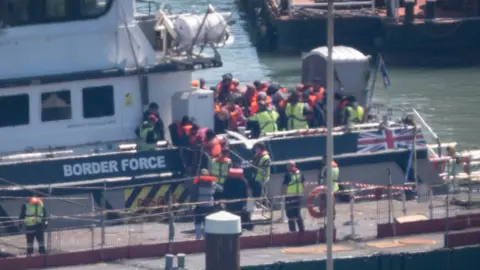The current migration crisis in the English Channel has resulted in a staggering number of over 10,000 crossings in the year 2025 alone, marking a notable increase of approximately 40% from the previous year during the same time frame. This surge was highlighted when 247 migrants crossed on a Sunday, bringing the cumulative total to 9,885, as recorded by the Home Office. The very next day, more than 200 additional individuals made the perilous journey, exceeding the 10,000 mark. Notably, in the prior year, this significant figure was only reached by May 24.
Efforts to address and mitigate these alarming trends have become a focal point for the UK government. A spokesperson for the Home Office has expressed their commitment to enhancing international partnerships aimed at disrupting criminal smuggling networks while also fortifying the country’s border security. Their approach includes legislative endeavors and the introduction of a new criminal offense targeting those who endanger lives at sea during such crossings.
Political dynamics surrounding the issue are multifaceted and contentious. The Labour Party campaigned in the recent general election, pledging to “smash” the organized crime syndicates involved in people smuggling operations, especially amidst a significant rise in crossings that has been noted since 2018. Upon taking office, the Labour government proposed several strategies such as the Border Security, Asylum, and Immigration Bill, which outlines their plan to deal with smugglers as harshly as terrorists, subjecting them to severe restrictions and penalties.
Political leaders on both sides are keenly aware of the implications these figures represent. Conservative shadow home secretary Chris Philp criticized Labour for reversing the previous administration’s Rwanda scheme, which he believes served as a deterrent against unauthorized Channel crossings. He stated, “Deterrents work,” emphasizing that the prospect of being sent elsewhere would dissuade individuals from attempting the crossing in the first place. Philp also disparaged Labour leader Keir Starmer’s claims of effectively combating the gangs, labeling them as “laughable.”
In response, Liberal Democrat Home Affairs spokesperson Lisa Smart expressed concern over the apparent inability of the current government to gain control over the situation, a predicament she attributes to the degradation of the asylum system under Conservative rule. She advocates for improved collaboration with international partners as a core strategy to tackle the dangerous crossings.
Among the political discourse, right-wing sentiments echo warnings about potential cultural consequences and financial costs associated with large migrant influxes. Reform UK leader Nigel Farage stated that if the trend persists, the results could culminate in an additional quarter million newcomers over the current Labour government’s tenure, raising fears about their integration and economic impact. He reiterated that his party stands firm in the belief that illegal arrivals need to be deported to deter future crossings.
From the government’s perspective, forecasts have indicated that over 5,400 migrants have been deterred from crossing due to various measures such as interceptions and returns. Official data from between July 2024 and March 2025 reveals that more than 24,000 individuals without the right to remain in the UK have been deported, with 6,339 of these being classified as “enforced returns.”
This intense ongoing debate over how to best address migration issues highlights the complexities and challenges policymakers face in balancing humanitarian concerns with national security. Public sentiment is mixed, as many citizens sympathize with the migrants’ plight while also expressing concern over the implications for public services and social cohesion. As the situation develops, the eyes of the nation are firmly fixed on the government’s actions and their effectiveness in curtailing this troubling trend.



